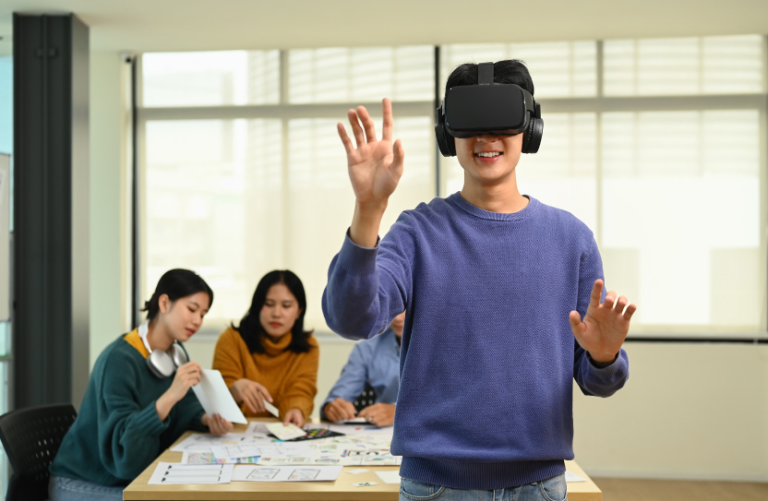
This software engineering course for virtual reality developers introduces entry level participants into the world of game design, the industry-standard game engine, and provides hands-on experience with cutting-edge technology.
As future software developers, our students will learn high-level programming languages, cross-platform scripting, and modern API integrations to create immersive and competitive games.
Emphasis is placed on efficiency and quality, with a strong focus on modular coding practices, understanding input controllers for various platforms, and adherence to quality standards for gameplay programming.
Join us and upgrade your skills in the Virtual Reality Course for Developers!
The targeted sector for this course primarily encompasses the video game and interactive media industry.
This sector has experienced exponential growth in recent years, driven by advancements in technology, the proliferation of gaming platforms, and the increasing demand for engaging digital experiences.
This course is also useful for in-house Virtual Reality developer starting their careers in the world of virtual and augmented reality.

1. Apply modular and efficient scripts to implement gameplay actions in Virtual or Augmented Reality applications
2. Develop effective quality control according to programming standards
3. Assemble a usable and robust prototype in the game engine
At the end of the course, you will be equipped with the skillset to design and develop gameplay elements on your own.
You will receive guidance from our expert trainers who are have minimum
Advanced Diploma in Software Engineering and are certified trainers by SkillsFuture Singapore!
3 days, 9am to 6pm each day – Including assessment
| Pre-Requisite | Able to use a computer effectively Able to understand simple game mechanics |
| Location | 320 Serangoon Road Centrium Square #10-03 |
| Assessment | Written test(MCQ) |
| Duration | 3 days (24hr) |
| Course Fee | $1250 before funding and GST |
| Course Language | English |
| Certification | WSQ Statement of Attainment |
| Funding | Valid for SG,PR and LTVP+ |
What you will learn from this skills upgrading software engineering course
Chapter 1: Programming Fundamentals In this foundational chapter, you will embark on your journey into game development by mastering the essential programming fundamentals. You will explore core programming concepts, which include variables, data types, conditional statements, loops, and functions. Understanding these concepts is crucial as they form the building blocks of any game development project.
Algorithm design is another key aspect covered in this software engineering course. You will learn how to design efficient algorithms to solve complex problems, a skill that is indispensable when creating games with intricate gameplay mechanics. Object-Oriented Programming (OOP) will also be a focal point. You’ll grasp the concepts of classes, objects, inheritance, and polymorphism, which are pivotal in organizing and structuring your game code.
Debugging is an integral part of the development process, and this chapter will equip you with the skills to identify and rectify issues in your code effectively. Additionally, you’ll learn about code efficiency, where you’ll discover techniques to optimize your game code for performance, ensuring smooth gameplay experiences for your players.
Chapter 2: Quality and Documentation Creating high-quality games goes beyond just writing code. In this chapter, you will learn about code quality standards, which include best practices for clean, maintainable, and readable code. These standards are essential for collaborating with other developers on larger game projects.
Testing and quality assurance are also significant aspects. You will understand how to design and execute test cases to ensure your game functions correctly and is free of critical bugs. Code reviews will be explored as a means of getting feedback from peers to improve your code further.
Documentation practices are crucial for both your benefit and that of other developers who may work on your project. You’ll discover how to create clear and concise documentation, including comments, API documentation, and user guides. Version control tools like Git will be introduced, enabling you to track changes in your code, collaborate with others, and revert to previous versions if needed.
Chapter 3: Prototyping and Code Development This chapter focuses on the practical aspects of game development. Rapid prototyping is a critical skill for quickly bringing your game ideas to life. You’ll learn how to create prototypes that demonstrate gameplay mechanics, allowing you to iterate and refine your concepts before full-scale development.
Game engine basics are introduced, with an emphasis on understanding how game engines work and their role in simplifying game development. Scripting languages are explored, enabling you to create interactive gameplay elements and control game behavior.
As you progress, you’ll dive into gameplay mechanics, gaining insight into creating engaging and immersive experiences for players. Code optimization techniques will continue to be an important theme, ensuring your game runs smoothly on various devices.